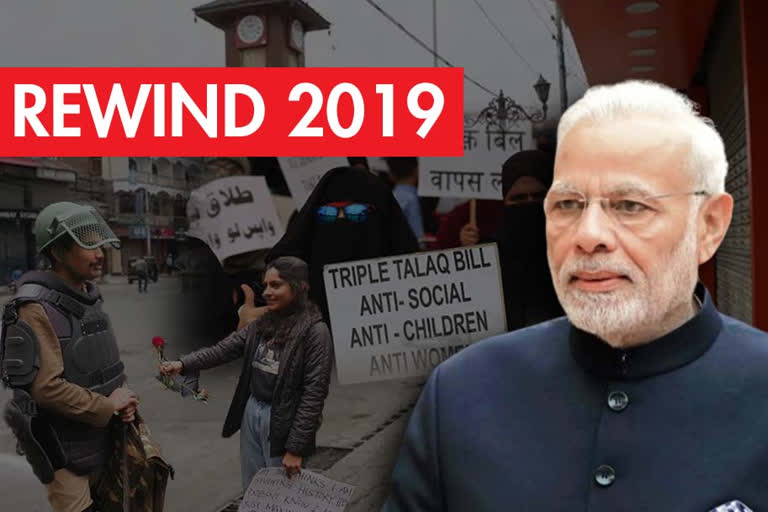Hyderabad: As the year 2019 ends leaving behind memories, both good and bad, let us recalculate what the Narendra Modi-led government achieved. While some moves earned the people’s praise, the government did go wrong in some places, marking a lasting scar for historians to pen about.
Many legal and Constitutional changes, appearing impossible, were marked during the year 2019, some of them landmark ones. The political, religious, and cultural landscaping by the present government, during the year, decimated the Congress built rhetoric - anything that surprises the nation is undemocratic. Most of the BJP’s decisions came with some elements of surprise and have somehow gone down well except the CAA (Citizenship Amendment Act, 2019).
The move on the most volatile Triple Talaq evoked no major reaction from the Muslim community barring a few obvious voices. People in the earlier governments were made to believe that anything that is religious is untouchable and shall not be talked or touched upon. The fear of blasphemy made them unassertive on some critical issues. But the BJP government took the lead and crusaded against the laws they pitched as stereotypical, anti-women, parochial, anti-human and then got them passed in both Houses of the Parliament.
The opposition parties and their point of view were made irrelevant to the extent that anyone questioning the government’s position, would make their nationalism suspicious. They linked almost every contentious issue with national integrity and security, leaving no scope for its criticism.
Abrogation of Article 370 was a masterstroke and one of the historic moves that this government made or any government could afford to make. The pre-abrogation planning was meticulous, though a harsh one and the anticipation of its aftermath shock was very well taken care of. Such was the arrangement that not even five per cent of what the government had expected was seen on the streets of Jammu and Kashmir.
Read: Year Ender 2019: Zeroed out stories of big attempts, wins and losses
The planning and the man-management were so thick that hardly any civilian moment was allowed for the first few weeks. The entire population was made to breathe without virtual space by shutting down the entire communication link between the erstwhile state and rest of the people - phone, landline and even internet. The whole political leadership - separatists and mainstream, was kept behind bars fearing they may mobilise people for mass agitation. Abrogation Article 370 and the bifurcation of the state into two Union Territories subsequently shocked the entire political spectrum.
The internet still remains shut in the region making it the world’s longest internet shutdown. International media criticised the move tooth and nail, but counter-narratives were produced to water down the impact. Pakistan being the party made it easy for India to weave a narrative which world powers are in agreement with, except China, Turkey, and Malaysia.
The oldest religious dispute between Muslims and Hindus - Ram Janmabhoomi and Babri Masjid, was settled in a meticulous way. The behaviour change module was well thought about before executing the plan. Most of the Muslim scholars had weeks before made public comments that Muslims should, as a goodwill gesture, hand over the land to Hindus for construction of Ram Mandir. If we go by the academics of political resistances, this government after Ram Mandir verdict could have put period(.) on the activities of the year had they not wanted resistance.
Read: India’s Foreign Policy Highlights in 2019
Inevitable had to happen as the government went unabated in making legal and Constitutional changes. The changes that were made before CAA (Citizenship Amendment Act) were not making a common goal for a particular community across India, thus no question of major nation-wide civil unrest was expected.
Last but not the least, the government marked a change in the law by bringing Citizenship (Amendment) Act 2019, allowing non-Muslim immigrants of Pakistan, Afghanistan and Bangladesh to become Indian citizens, who have entered the Indian territory before 31st Dec 2014. This time, the government was caught red-faced as it had not, perhaps, anticipated such a huge reaction which resulted in a bloodbath in Uttar Pradesh and violent protests elsewhere that witnessed the death of around 20 civilians in UP alone.
After the Act was passed in both the Houses, the Home Minister kept saying on TV shows that the fact that non-Muslims who face religious persecution anywhere across the globe can look upon India for their safety, has actually shaken the very foundation of secular nature of the country. This very statement was perceived as shutting doors for Muslims even for those (Muslims) who face any sort of persecution.
Earlier, the amendments made in the Constitution seemed to supplement it with more ingredients of equality and uniformity. Complacence, as they say, is very bad in politics. The complacency of being a party above nation and above people’s mandate had to face severe criticism. Moral: don’t go beyond people’s mandate.



